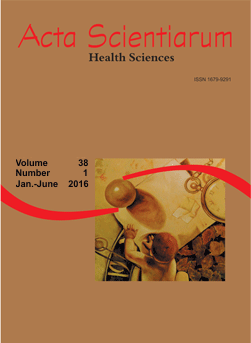<b>Factors related to blood pressure control in a prospective cohort of hypertensive outpatients
Resumo
Previous studies have reported a controversial relationship between inadequate blood pressure control and predictor variables. Current prospective cohort study analyzes the interference of age, gender, diabetes and medication adherence in the control of blood pressure of hypertensive outpatients. Patients were interviewed under blind conditions to determine medication adherence, and clinical variables assessment were standardized. Univariate analysis of variance identified the variables correlated to blood pressure control at the end of the follow-up period. Missing data were excluded from analysis. After adjusting for confounders with univariate analysis, the association between the outcome (BP control rate) with significant factors and the calculated adjusted odds ratios (OR) and their 95% CI was analyzed by logistic regression. No interference by age or medication adherence in blood pressure control was reported. In fact, the higher the number of medications in use, the greater were the chances of having blood pressure control in disorder. Females are associated with a 3.1 increase in odds ratio of poor blood pressure control. Compared with non-diabetic hypertensive patients, hypertensive diabetic ones had a lower chance of poor blood pressure control.
Downloads
DECLARAÇÃO DE ORIGINALIDADE E DIREITOS AUTORAIS
Declaro que o presente artigo é original, não tendo sido submetido à publicação em qualquer outro periódico nacional ou internacional, quer seja em parte ou em sua totalidade.
Os direitos autorais pertencem exclusivamente aos autores. Os direitos de licenciamento utilizados pelo periódico é a licença Creative Commons Attribution 4 .0 (CC BY 4.0): são permitidos o acompartilhamento (cópia e distribuição do material em qualqer meio ou formato) e adaptação (remix, transformação e criação de material a partir do conteúdo assim licenciado para quaisquer fins, inclusive comerciais.
Recomenda-se a leitura desse link para maiores informações sobre o tema: fornecimento de créditos e referências de forma correta, entre outros detalhes cruciais para uso adequado do material licenciado.





























